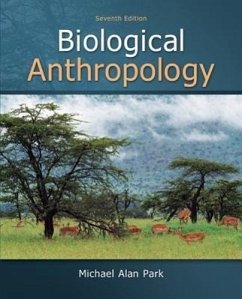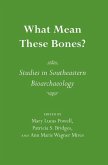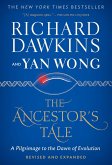Michael Alan Park
Biological Anthropology
Michael Alan Park
Biological Anthropology
- Broschiertes Buch
- Merkliste
- Auf die Merkliste
- Bewerten Bewerten
- Teilen
- Produkt teilen
- Produkterinnerung
- Produkterinnerung
Biological Anthropology is a concise introduction to the basic themes, theories, methods and facts of bioanthropology. The scientific method provides a framework that brings accessibility and context to the material. This seventh edition presents the most recent findings and interpretations of topics in anthropology including Australopithecus sediba, the Denisovians, and epigenetics.
Andere Kunden interessierten sich auch für
![A Portrait of Humankind A Portrait of Humankind]() A Portrait of Humankind112,99 €
A Portrait of Humankind112,99 €![What Mean These Bones? What Mean These Bones?]() What Mean These Bones?35,99 €
What Mean These Bones?35,99 €![Incest Avoidance and the Incest Taboos Incest Avoidance and the Incest Taboos]() Arthur P WolfIncest Avoidance and the Incest Taboos17,99 €
Arthur P WolfIncest Avoidance and the Incest Taboos17,99 €![Olduvai Gorge 5 Volume Paperback Set Olduvai Gorge 5 Volume Paperback Set]() Mary LeakeyOlduvai Gorge 5 Volume Paperback Set242,99 €
Mary LeakeyOlduvai Gorge 5 Volume Paperback Set242,99 €![The Ancestor's Tale The Ancestor's Tale]() Richard DawkinsThe Ancestor's Tale23,99 €
Richard DawkinsThe Ancestor's Tale23,99 €![Homo Erectus Homo Erectus]() Homo Erectus51,99 €
Homo Erectus51,99 €![The Rise and Reign of the Mammals The Rise and Reign of the Mammals]() Steve BrusatteThe Rise and Reign of the Mammals29,99 €
Steve BrusatteThe Rise and Reign of the Mammals29,99 €-
Biological Anthropology is a concise introduction to the basic themes, theories, methods and facts of bioanthropology. The scientific method provides a framework that brings accessibility and context to the material. This seventh edition presents the most recent findings and interpretations of topics in anthropology including Australopithecus sediba, the Denisovians, and epigenetics.
Hinweis: Dieser Artikel kann nur an eine deutsche Lieferadresse ausgeliefert werden.
Hinweis: Dieser Artikel kann nur an eine deutsche Lieferadresse ausgeliefert werden.
Produktdetails
- Produktdetails
- Verlag: McGraw Hill LLC
- 7th Revised edition
- Seitenzahl: 432
- Erscheinungstermin: 4. Mai 2012
- Englisch
- Abmessung: 231mm x 185mm x 18mm
- Gewicht: 635g
- ISBN-13: 9780078034954
- ISBN-10: 0078034957
- Artikelnr.: 35712466
- Herstellerkennzeichnung
- Libri GmbH
- Europaallee 1
- 36244 Bad Hersfeld
- gpsr@libri.de
- Verlag: McGraw Hill LLC
- 7th Revised edition
- Seitenzahl: 432
- Erscheinungstermin: 4. Mai 2012
- Englisch
- Abmessung: 231mm x 185mm x 18mm
- Gewicht: 635g
- ISBN-13: 9780078034954
- ISBN-10: 0078034957
- Artikelnr.: 35712466
- Herstellerkennzeichnung
- Libri GmbH
- Europaallee 1
- 36244 Bad Hersfeld
- gpsr@libri.de
Preface
To the Reader
1 Biological Anthropology
In the Field: Doing Biological Anthropology
Among the Hutterites
A Hawaiian in Connecticut
What Is Biological Anthropology?
Defining Anthropology
The Specialties of Bioanthropology
Bioanthropology and Science
The Scientific Method
Some Common Misconceptions about Science
Science Is Conducted in a Cultural Context
Contemporary Reflections: Is Evolution a Fact, a Theory, or Just a
Hypothesis?
Summary
Questions for Further Thought
Key Terms
Suggested Readings
2 The Evolution of Evolution
"On the Shoulders of Giants": Explaining the Changing Earth
The Biblical Context
The Framework of "Natural Philosophy"
"Common Sense at Its Best": Explaining Biological Change
Darwin's Predecessors
Charles Darwin
The Modern Theory of Evolution
Contemporary Reflections: Has Science Dehumanized Society?
Summary
Questions for Further Thought
Key Terms
Suggested Readings
3 Evolutionary Genetics
How Genes Work
An Overview of the Human Genome
From Genes to Traits
How Inheritance Works
Contemporary Reflections: What is Genetic Cloning?
Summary
Questions for Further Thought
Key Terms
Suggested Readings
4 The Processes of Evolution
Species: The Units of Evolution
The Four Processes of Evolution
Mutations: Necessary Errors
Natural Selection: The Prime Mover of Evolution
Gene Flow: Mixing Populations' Genes
Genetic Drift: Random Evolution
Sickle Cell Anemia: Evolutionary Processes in Action
Genetics and Symptoms
Contemporary Reflections: Are Humans Still Evolving?
The Adaptive Explanation
Other Relationships
Summary
Questions for Further Thought
Key Terms
Suggested Readings
5 The Origin of Species and the Shape of Evolution
New Species
Reproductive Isolating Mechanisms
Processes of Speciation
The Evolution of Life's Diversity
Our Family Tree
Adaptive Radiation
The Grand Pattern of Evolution
The Pattern of Speciation
Species Selection
Catastrophic Mass Extinctions
Contemporary Reflections: Are There Alternatives to Evolution?
Summary
Questions for Further Thought
Key Terms
Suggested Readings
6 A Brief Evolutionary Timetable
From the Beginning: A Quick History
Drifting Continents and Mass Extinctions: The Pace of Change
Contemporary Reflections: Are Mass Extinctions a Thing of the Past?
Summary
Questions for Further Thought
Key Terms
Suggested Readings
7 The Primates
Naming the Animals
What Is a Primate?
The Senses
Movement
Reproduction
Intelligence
Behavior Patterns
The Primate Adaptive Strategy
A Survey of the Living Primates
Prosimians
Anthropoids
The Human Primate
The Senses
Movement
Reproduction
Contemporary Reflections: What Is the Status of Our Closest Relatives?
Intelligence
Behavior Patterns
Are We Hominids or Hominins?
Summary
Questions for Further Thought
Key Terms
Suggested Readings
8 Primate Behavior and Human Evolution
Behavioral Evolution
How Do Complex Behaviors Evolve?
How Do We Study Behavior?
Primate Behavior
Baboons
Chimpanzees
Bonobos
Culture and Social Cognition
Contemporary Reflections: Are Some Human Behaviors Genetic?
Summary
Questions for Further Thought
Key Terms
Suggested Readings
9 Studying the Human Past
Bones: The Primate Skeleton
Old Bones: Locating, Recovering, and Dating Fossils
Finding Fossils
Recovering Fossils
Dating Fossils
How Fossils Get to Be Fossils
Genes: New Windows to the Past
The "Molecular Clock"
The Genetic Differences between Chimps and Humans
Contemporary Reflections: Who Owns Old Bones?
Summary
Questions for Further Thought
Key Terms
Suggested Readings
10 Evolution of the Early Hominids
The Origin and Evolution of the Primates
Bipedalism
The Benefits of Bipedalism
The Evolution of Bipedalism
The Early Hominids
Australopithecus
Paranthropus
The Search for the First Hominids
Ardipithecus
Kenyanthropus
Orrorin
Sahelanthropus
Putting It All Together
Connecting the Dots
The Ecological Context
Contemporary Reflections: Is There a "Missing Link"?
Summary
Questions for Further Thought
Key Terms
Suggested Readings
11 The Evolution of Genus Homo
The Nature of Genus Homo
The First Members of Genus Homo
The First Stone Tools
The Fossils
A New Adaptive Mode
To New Lands
The First Fossils
Migration and the Ice Ages
The Life of Homo erectus
Big Brains, Archaic Skulls
Homo antecessor
Homo heidelbergensis
The Neandertals
Physical Features
Culture
Modern Humans
Anatomy
Dates
Culture
Contemporary Reflections: Who Are the "Hobbits" from Indonesia?
More Neandertals and Yet Another Human Group?
The Debate Over Modern Human Origins
The Models
The Evidence
Is This Debate Important?
Summary
Questions for Further Thought
Key Terms
Suggested Readings
12 Evolution and Adaptation in Human Populations
Population Adaptations
Species Adaptations
Variation in Adaptations
Are All Variations Adaptively Important?
Disease and Human Populations
Diseases are "Natural"
Disease and Hominid Evolution
Disease and Human History
Emerging Diseases
Contemporary Reflections: Are There Jewish Diseases? Are There Black
Pharmaceuticals?
Summary
Questions for Further Thought
Key Terms
Suggested Readings
13 Human Biological Diversity
Sex and Gender
Why Are There No Biological Races Within the Human Species?
Race as a Biological Concept
Human Phenotypic Variation
Genetic Variation
Evolutionary Theory
What, Then, Are Human Races?
Anthropology and the History of Race Studies
Race, Bioanthropology, and Social Issues
Race and Intelligence
Race and Athletic Ability
Contemporary Reflections: Are Genetic Ancestry Tests Worth the Money?
Summary
Questions for Further Thought
Key Terms
Suggested Readings
14 Biological Anthropology and Today's World
Forensic Anthropology: Reading the Bones
Lessons from the Past
Bioanthropology and Global Issues
Contemporary Reflections: What Can One Do with a Degree in Bioanthropology?
Summary
Questions for Further Thought
Key Terms
Suggested Readings
Appendix I: Protein Synthesis and the Genetic Code
Appendix II: Genes in Populations
Glossary of Human and Nonhuman Primates
Glossary of Terms
References
Credits
Index
To the Reader
1 Biological Anthropology
In the Field: Doing Biological Anthropology
Among the Hutterites
A Hawaiian in Connecticut
What Is Biological Anthropology?
Defining Anthropology
The Specialties of Bioanthropology
Bioanthropology and Science
The Scientific Method
Some Common Misconceptions about Science
Science Is Conducted in a Cultural Context
Contemporary Reflections: Is Evolution a Fact, a Theory, or Just a
Hypothesis?
Summary
Questions for Further Thought
Key Terms
Suggested Readings
2 The Evolution of Evolution
"On the Shoulders of Giants": Explaining the Changing Earth
The Biblical Context
The Framework of "Natural Philosophy"
"Common Sense at Its Best": Explaining Biological Change
Darwin's Predecessors
Charles Darwin
The Modern Theory of Evolution
Contemporary Reflections: Has Science Dehumanized Society?
Summary
Questions for Further Thought
Key Terms
Suggested Readings
3 Evolutionary Genetics
How Genes Work
An Overview of the Human Genome
From Genes to Traits
How Inheritance Works
Contemporary Reflections: What is Genetic Cloning?
Summary
Questions for Further Thought
Key Terms
Suggested Readings
4 The Processes of Evolution
Species: The Units of Evolution
The Four Processes of Evolution
Mutations: Necessary Errors
Natural Selection: The Prime Mover of Evolution
Gene Flow: Mixing Populations' Genes
Genetic Drift: Random Evolution
Sickle Cell Anemia: Evolutionary Processes in Action
Genetics and Symptoms
Contemporary Reflections: Are Humans Still Evolving?
The Adaptive Explanation
Other Relationships
Summary
Questions for Further Thought
Key Terms
Suggested Readings
5 The Origin of Species and the Shape of Evolution
New Species
Reproductive Isolating Mechanisms
Processes of Speciation
The Evolution of Life's Diversity
Our Family Tree
Adaptive Radiation
The Grand Pattern of Evolution
The Pattern of Speciation
Species Selection
Catastrophic Mass Extinctions
Contemporary Reflections: Are There Alternatives to Evolution?
Summary
Questions for Further Thought
Key Terms
Suggested Readings
6 A Brief Evolutionary Timetable
From the Beginning: A Quick History
Drifting Continents and Mass Extinctions: The Pace of Change
Contemporary Reflections: Are Mass Extinctions a Thing of the Past?
Summary
Questions for Further Thought
Key Terms
Suggested Readings
7 The Primates
Naming the Animals
What Is a Primate?
The Senses
Movement
Reproduction
Intelligence
Behavior Patterns
The Primate Adaptive Strategy
A Survey of the Living Primates
Prosimians
Anthropoids
The Human Primate
The Senses
Movement
Reproduction
Contemporary Reflections: What Is the Status of Our Closest Relatives?
Intelligence
Behavior Patterns
Are We Hominids or Hominins?
Summary
Questions for Further Thought
Key Terms
Suggested Readings
8 Primate Behavior and Human Evolution
Behavioral Evolution
How Do Complex Behaviors Evolve?
How Do We Study Behavior?
Primate Behavior
Baboons
Chimpanzees
Bonobos
Culture and Social Cognition
Contemporary Reflections: Are Some Human Behaviors Genetic?
Summary
Questions for Further Thought
Key Terms
Suggested Readings
9 Studying the Human Past
Bones: The Primate Skeleton
Old Bones: Locating, Recovering, and Dating Fossils
Finding Fossils
Recovering Fossils
Dating Fossils
How Fossils Get to Be Fossils
Genes: New Windows to the Past
The "Molecular Clock"
The Genetic Differences between Chimps and Humans
Contemporary Reflections: Who Owns Old Bones?
Summary
Questions for Further Thought
Key Terms
Suggested Readings
10 Evolution of the Early Hominids
The Origin and Evolution of the Primates
Bipedalism
The Benefits of Bipedalism
The Evolution of Bipedalism
The Early Hominids
Australopithecus
Paranthropus
The Search for the First Hominids
Ardipithecus
Kenyanthropus
Orrorin
Sahelanthropus
Putting It All Together
Connecting the Dots
The Ecological Context
Contemporary Reflections: Is There a "Missing Link"?
Summary
Questions for Further Thought
Key Terms
Suggested Readings
11 The Evolution of Genus Homo
The Nature of Genus Homo
The First Members of Genus Homo
The First Stone Tools
The Fossils
A New Adaptive Mode
To New Lands
The First Fossils
Migration and the Ice Ages
The Life of Homo erectus
Big Brains, Archaic Skulls
Homo antecessor
Homo heidelbergensis
The Neandertals
Physical Features
Culture
Modern Humans
Anatomy
Dates
Culture
Contemporary Reflections: Who Are the "Hobbits" from Indonesia?
More Neandertals and Yet Another Human Group?
The Debate Over Modern Human Origins
The Models
The Evidence
Is This Debate Important?
Summary
Questions for Further Thought
Key Terms
Suggested Readings
12 Evolution and Adaptation in Human Populations
Population Adaptations
Species Adaptations
Variation in Adaptations
Are All Variations Adaptively Important?
Disease and Human Populations
Diseases are "Natural"
Disease and Hominid Evolution
Disease and Human History
Emerging Diseases
Contemporary Reflections: Are There Jewish Diseases? Are There Black
Pharmaceuticals?
Summary
Questions for Further Thought
Key Terms
Suggested Readings
13 Human Biological Diversity
Sex and Gender
Why Are There No Biological Races Within the Human Species?
Race as a Biological Concept
Human Phenotypic Variation
Genetic Variation
Evolutionary Theory
What, Then, Are Human Races?
Anthropology and the History of Race Studies
Race, Bioanthropology, and Social Issues
Race and Intelligence
Race and Athletic Ability
Contemporary Reflections: Are Genetic Ancestry Tests Worth the Money?
Summary
Questions for Further Thought
Key Terms
Suggested Readings
14 Biological Anthropology and Today's World
Forensic Anthropology: Reading the Bones
Lessons from the Past
Bioanthropology and Global Issues
Contemporary Reflections: What Can One Do with a Degree in Bioanthropology?
Summary
Questions for Further Thought
Key Terms
Suggested Readings
Appendix I: Protein Synthesis and the Genetic Code
Appendix II: Genes in Populations
Glossary of Human and Nonhuman Primates
Glossary of Terms
References
Credits
Index
Preface
To the Reader
1 Biological Anthropology
In the Field: Doing Biological Anthropology
Among the Hutterites
A Hawaiian in Connecticut
What Is Biological Anthropology?
Defining Anthropology
The Specialties of Bioanthropology
Bioanthropology and Science
The Scientific Method
Some Common Misconceptions about Science
Science Is Conducted in a Cultural Context
Contemporary Reflections: Is Evolution a Fact, a Theory, or Just a
Hypothesis?
Summary
Questions for Further Thought
Key Terms
Suggested Readings
2 The Evolution of Evolution
"On the Shoulders of Giants": Explaining the Changing Earth
The Biblical Context
The Framework of "Natural Philosophy"
"Common Sense at Its Best": Explaining Biological Change
Darwin's Predecessors
Charles Darwin
The Modern Theory of Evolution
Contemporary Reflections: Has Science Dehumanized Society?
Summary
Questions for Further Thought
Key Terms
Suggested Readings
3 Evolutionary Genetics
How Genes Work
An Overview of the Human Genome
From Genes to Traits
How Inheritance Works
Contemporary Reflections: What is Genetic Cloning?
Summary
Questions for Further Thought
Key Terms
Suggested Readings
4 The Processes of Evolution
Species: The Units of Evolution
The Four Processes of Evolution
Mutations: Necessary Errors
Natural Selection: The Prime Mover of Evolution
Gene Flow: Mixing Populations' Genes
Genetic Drift: Random Evolution
Sickle Cell Anemia: Evolutionary Processes in Action
Genetics and Symptoms
Contemporary Reflections: Are Humans Still Evolving?
The Adaptive Explanation
Other Relationships
Summary
Questions for Further Thought
Key Terms
Suggested Readings
5 The Origin of Species and the Shape of Evolution
New Species
Reproductive Isolating Mechanisms
Processes of Speciation
The Evolution of Life's Diversity
Our Family Tree
Adaptive Radiation
The Grand Pattern of Evolution
The Pattern of Speciation
Species Selection
Catastrophic Mass Extinctions
Contemporary Reflections: Are There Alternatives to Evolution?
Summary
Questions for Further Thought
Key Terms
Suggested Readings
6 A Brief Evolutionary Timetable
From the Beginning: A Quick History
Drifting Continents and Mass Extinctions: The Pace of Change
Contemporary Reflections: Are Mass Extinctions a Thing of the Past?
Summary
Questions for Further Thought
Key Terms
Suggested Readings
7 The Primates
Naming the Animals
What Is a Primate?
The Senses
Movement
Reproduction
Intelligence
Behavior Patterns
The Primate Adaptive Strategy
A Survey of the Living Primates
Prosimians
Anthropoids
The Human Primate
The Senses
Movement
Reproduction
Contemporary Reflections: What Is the Status of Our Closest Relatives?
Intelligence
Behavior Patterns
Are We Hominids or Hominins?
Summary
Questions for Further Thought
Key Terms
Suggested Readings
8 Primate Behavior and Human Evolution
Behavioral Evolution
How Do Complex Behaviors Evolve?
How Do We Study Behavior?
Primate Behavior
Baboons
Chimpanzees
Bonobos
Culture and Social Cognition
Contemporary Reflections: Are Some Human Behaviors Genetic?
Summary
Questions for Further Thought
Key Terms
Suggested Readings
9 Studying the Human Past
Bones: The Primate Skeleton
Old Bones: Locating, Recovering, and Dating Fossils
Finding Fossils
Recovering Fossils
Dating Fossils
How Fossils Get to Be Fossils
Genes: New Windows to the Past
The "Molecular Clock"
The Genetic Differences between Chimps and Humans
Contemporary Reflections: Who Owns Old Bones?
Summary
Questions for Further Thought
Key Terms
Suggested Readings
10 Evolution of the Early Hominids
The Origin and Evolution of the Primates
Bipedalism
The Benefits of Bipedalism
The Evolution of Bipedalism
The Early Hominids
Australopithecus
Paranthropus
The Search for the First Hominids
Ardipithecus
Kenyanthropus
Orrorin
Sahelanthropus
Putting It All Together
Connecting the Dots
The Ecological Context
Contemporary Reflections: Is There a "Missing Link"?
Summary
Questions for Further Thought
Key Terms
Suggested Readings
11 The Evolution of Genus Homo
The Nature of Genus Homo
The First Members of Genus Homo
The First Stone Tools
The Fossils
A New Adaptive Mode
To New Lands
The First Fossils
Migration and the Ice Ages
The Life of Homo erectus
Big Brains, Archaic Skulls
Homo antecessor
Homo heidelbergensis
The Neandertals
Physical Features
Culture
Modern Humans
Anatomy
Dates
Culture
Contemporary Reflections: Who Are the "Hobbits" from Indonesia?
More Neandertals and Yet Another Human Group?
The Debate Over Modern Human Origins
The Models
The Evidence
Is This Debate Important?
Summary
Questions for Further Thought
Key Terms
Suggested Readings
12 Evolution and Adaptation in Human Populations
Population Adaptations
Species Adaptations
Variation in Adaptations
Are All Variations Adaptively Important?
Disease and Human Populations
Diseases are "Natural"
Disease and Hominid Evolution
Disease and Human History
Emerging Diseases
Contemporary Reflections: Are There Jewish Diseases? Are There Black
Pharmaceuticals?
Summary
Questions for Further Thought
Key Terms
Suggested Readings
13 Human Biological Diversity
Sex and Gender
Why Are There No Biological Races Within the Human Species?
Race as a Biological Concept
Human Phenotypic Variation
Genetic Variation
Evolutionary Theory
What, Then, Are Human Races?
Anthropology and the History of Race Studies
Race, Bioanthropology, and Social Issues
Race and Intelligence
Race and Athletic Ability
Contemporary Reflections: Are Genetic Ancestry Tests Worth the Money?
Summary
Questions for Further Thought
Key Terms
Suggested Readings
14 Biological Anthropology and Today's World
Forensic Anthropology: Reading the Bones
Lessons from the Past
Bioanthropology and Global Issues
Contemporary Reflections: What Can One Do with a Degree in Bioanthropology?
Summary
Questions for Further Thought
Key Terms
Suggested Readings
Appendix I: Protein Synthesis and the Genetic Code
Appendix II: Genes in Populations
Glossary of Human and Nonhuman Primates
Glossary of Terms
References
Credits
Index
To the Reader
1 Biological Anthropology
In the Field: Doing Biological Anthropology
Among the Hutterites
A Hawaiian in Connecticut
What Is Biological Anthropology?
Defining Anthropology
The Specialties of Bioanthropology
Bioanthropology and Science
The Scientific Method
Some Common Misconceptions about Science
Science Is Conducted in a Cultural Context
Contemporary Reflections: Is Evolution a Fact, a Theory, or Just a
Hypothesis?
Summary
Questions for Further Thought
Key Terms
Suggested Readings
2 The Evolution of Evolution
"On the Shoulders of Giants": Explaining the Changing Earth
The Biblical Context
The Framework of "Natural Philosophy"
"Common Sense at Its Best": Explaining Biological Change
Darwin's Predecessors
Charles Darwin
The Modern Theory of Evolution
Contemporary Reflections: Has Science Dehumanized Society?
Summary
Questions for Further Thought
Key Terms
Suggested Readings
3 Evolutionary Genetics
How Genes Work
An Overview of the Human Genome
From Genes to Traits
How Inheritance Works
Contemporary Reflections: What is Genetic Cloning?
Summary
Questions for Further Thought
Key Terms
Suggested Readings
4 The Processes of Evolution
Species: The Units of Evolution
The Four Processes of Evolution
Mutations: Necessary Errors
Natural Selection: The Prime Mover of Evolution
Gene Flow: Mixing Populations' Genes
Genetic Drift: Random Evolution
Sickle Cell Anemia: Evolutionary Processes in Action
Genetics and Symptoms
Contemporary Reflections: Are Humans Still Evolving?
The Adaptive Explanation
Other Relationships
Summary
Questions for Further Thought
Key Terms
Suggested Readings
5 The Origin of Species and the Shape of Evolution
New Species
Reproductive Isolating Mechanisms
Processes of Speciation
The Evolution of Life's Diversity
Our Family Tree
Adaptive Radiation
The Grand Pattern of Evolution
The Pattern of Speciation
Species Selection
Catastrophic Mass Extinctions
Contemporary Reflections: Are There Alternatives to Evolution?
Summary
Questions for Further Thought
Key Terms
Suggested Readings
6 A Brief Evolutionary Timetable
From the Beginning: A Quick History
Drifting Continents and Mass Extinctions: The Pace of Change
Contemporary Reflections: Are Mass Extinctions a Thing of the Past?
Summary
Questions for Further Thought
Key Terms
Suggested Readings
7 The Primates
Naming the Animals
What Is a Primate?
The Senses
Movement
Reproduction
Intelligence
Behavior Patterns
The Primate Adaptive Strategy
A Survey of the Living Primates
Prosimians
Anthropoids
The Human Primate
The Senses
Movement
Reproduction
Contemporary Reflections: What Is the Status of Our Closest Relatives?
Intelligence
Behavior Patterns
Are We Hominids or Hominins?
Summary
Questions for Further Thought
Key Terms
Suggested Readings
8 Primate Behavior and Human Evolution
Behavioral Evolution
How Do Complex Behaviors Evolve?
How Do We Study Behavior?
Primate Behavior
Baboons
Chimpanzees
Bonobos
Culture and Social Cognition
Contemporary Reflections: Are Some Human Behaviors Genetic?
Summary
Questions for Further Thought
Key Terms
Suggested Readings
9 Studying the Human Past
Bones: The Primate Skeleton
Old Bones: Locating, Recovering, and Dating Fossils
Finding Fossils
Recovering Fossils
Dating Fossils
How Fossils Get to Be Fossils
Genes: New Windows to the Past
The "Molecular Clock"
The Genetic Differences between Chimps and Humans
Contemporary Reflections: Who Owns Old Bones?
Summary
Questions for Further Thought
Key Terms
Suggested Readings
10 Evolution of the Early Hominids
The Origin and Evolution of the Primates
Bipedalism
The Benefits of Bipedalism
The Evolution of Bipedalism
The Early Hominids
Australopithecus
Paranthropus
The Search for the First Hominids
Ardipithecus
Kenyanthropus
Orrorin
Sahelanthropus
Putting It All Together
Connecting the Dots
The Ecological Context
Contemporary Reflections: Is There a "Missing Link"?
Summary
Questions for Further Thought
Key Terms
Suggested Readings
11 The Evolution of Genus Homo
The Nature of Genus Homo
The First Members of Genus Homo
The First Stone Tools
The Fossils
A New Adaptive Mode
To New Lands
The First Fossils
Migration and the Ice Ages
The Life of Homo erectus
Big Brains, Archaic Skulls
Homo antecessor
Homo heidelbergensis
The Neandertals
Physical Features
Culture
Modern Humans
Anatomy
Dates
Culture
Contemporary Reflections: Who Are the "Hobbits" from Indonesia?
More Neandertals and Yet Another Human Group?
The Debate Over Modern Human Origins
The Models
The Evidence
Is This Debate Important?
Summary
Questions for Further Thought
Key Terms
Suggested Readings
12 Evolution and Adaptation in Human Populations
Population Adaptations
Species Adaptations
Variation in Adaptations
Are All Variations Adaptively Important?
Disease and Human Populations
Diseases are "Natural"
Disease and Hominid Evolution
Disease and Human History
Emerging Diseases
Contemporary Reflections: Are There Jewish Diseases? Are There Black
Pharmaceuticals?
Summary
Questions for Further Thought
Key Terms
Suggested Readings
13 Human Biological Diversity
Sex and Gender
Why Are There No Biological Races Within the Human Species?
Race as a Biological Concept
Human Phenotypic Variation
Genetic Variation
Evolutionary Theory
What, Then, Are Human Races?
Anthropology and the History of Race Studies
Race, Bioanthropology, and Social Issues
Race and Intelligence
Race and Athletic Ability
Contemporary Reflections: Are Genetic Ancestry Tests Worth the Money?
Summary
Questions for Further Thought
Key Terms
Suggested Readings
14 Biological Anthropology and Today's World
Forensic Anthropology: Reading the Bones
Lessons from the Past
Bioanthropology and Global Issues
Contemporary Reflections: What Can One Do with a Degree in Bioanthropology?
Summary
Questions for Further Thought
Key Terms
Suggested Readings
Appendix I: Protein Synthesis and the Genetic Code
Appendix II: Genes in Populations
Glossary of Human and Nonhuman Primates
Glossary of Terms
References
Credits
Index








